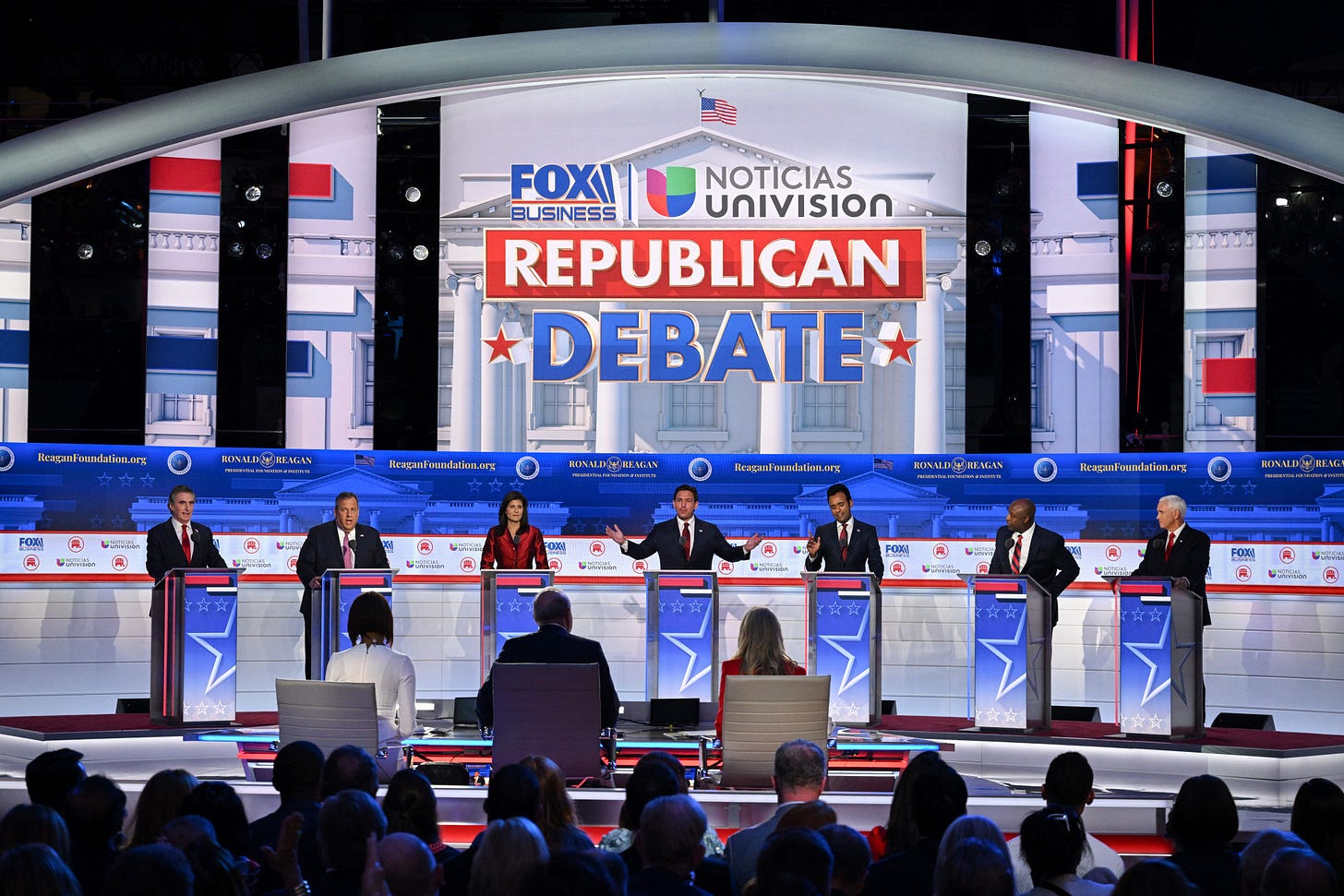In Trump’s Shadow, a Meaningless Debate
They squabbled about policy and interrupted one another, but the Republican presidential candidates had little to say about the guy clobbering them all.

HOSTED AT THE REAGAN LIBRARY, Wednesday night’s GOP presidential debate billed the primary race as a “time for choosing,” but avoided discussing the choice that matters most. It felt like a broadcast from an alternate dimension—one where the Senate had convicted Donald Trump in the January 6th impeachment and barred him from office, freeing up Republicans to leave Trump and all his baggage behind them and hash out serious policy questions.
But back in our reality, Trump, despite having now skipped both of the first two debates, is crushing in the primary polls, with 30-point leads in Iowa, New Hampshire, South Carolina, and Nevada, and more support in the RealClearPolitics national average than every candidate on the debate stage combined.
And yet once again, no one really went after Trump. Viewers saw a traditional mix of arguments, sound bites, self-aggrandizement, and BS, but reticence to challenge the frontrunner. Chris Christie and Ron DeSantis both repeated Nikki Haley’s criticism from the first debate that Trump, like Biden, ran up debt in office. Both tried calling Trump weak for not debating. DeSantis got in a mild shot at Trump as insufficiently pro-life. Christie, in his closing words, called Trump divisive. And that’s about it.
A New York state court just found that Trump committed financial fraud, effectively shutting down major components of his business empire, and none of his supposed competitors made it into a political attack. None tried to make a What type of party do we want to be? case against corruption and authoritarianism.
It was surreal, how the debate moderators avoided the profound, historical question of nominating a man who will be on trial for federal felonies during the campaign. And it was ridiculous that no candidate mentioned that the man they trail in the polls makes anti-democracy assertions on a regular basis, such as recently insinuating that America’s top general should be executed.
Instead, they largely focused on policy topics, such as the border, energy, education, health care, China, and Ukraine.
Don’t get me wrong, it’s nice to hear candidates engage real issues—it’s just that they’re ducking the biggest one.
In its current incarnation, the Republican party’s top issue—the one policy they are most committed to, and most likely to enact if they get power—is putting Donald Trump above the law.
But that didn’t come up, especially not for criticism. At most, Mike Pence vaguely alluded to it by advocating “conservatism,” in contrast to following “the siren song of populism.” This has lately been a favorite line of Pence’s—but it’s a sound bite with no bite, since Pence didn’t mention anything specific, let alone name his former running mate.
The Republican party shows every sign of repeating its 2020 choice, when it didn’t pass a platform and said it would simply support Donald Trump. By lining up behind him now, despite his attempt to stay in power after losing the last election, and multiple serious, credible criminal indictments, Republican primary voters are turning the 2024 election into a referendum on democracy and rule of law itself.
But everyone involved went through the motions of a beforetimes primary debate, as if everything were normal. So we were treated to two hours of pretending, as the candidates and moderators displayed the denial and enabling that helped bring America to this dangerous point.



